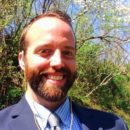We have much more to do and your continued support is needed now more than ever.
Climate Equity Pavilion a First at Semiconductor Industry Event
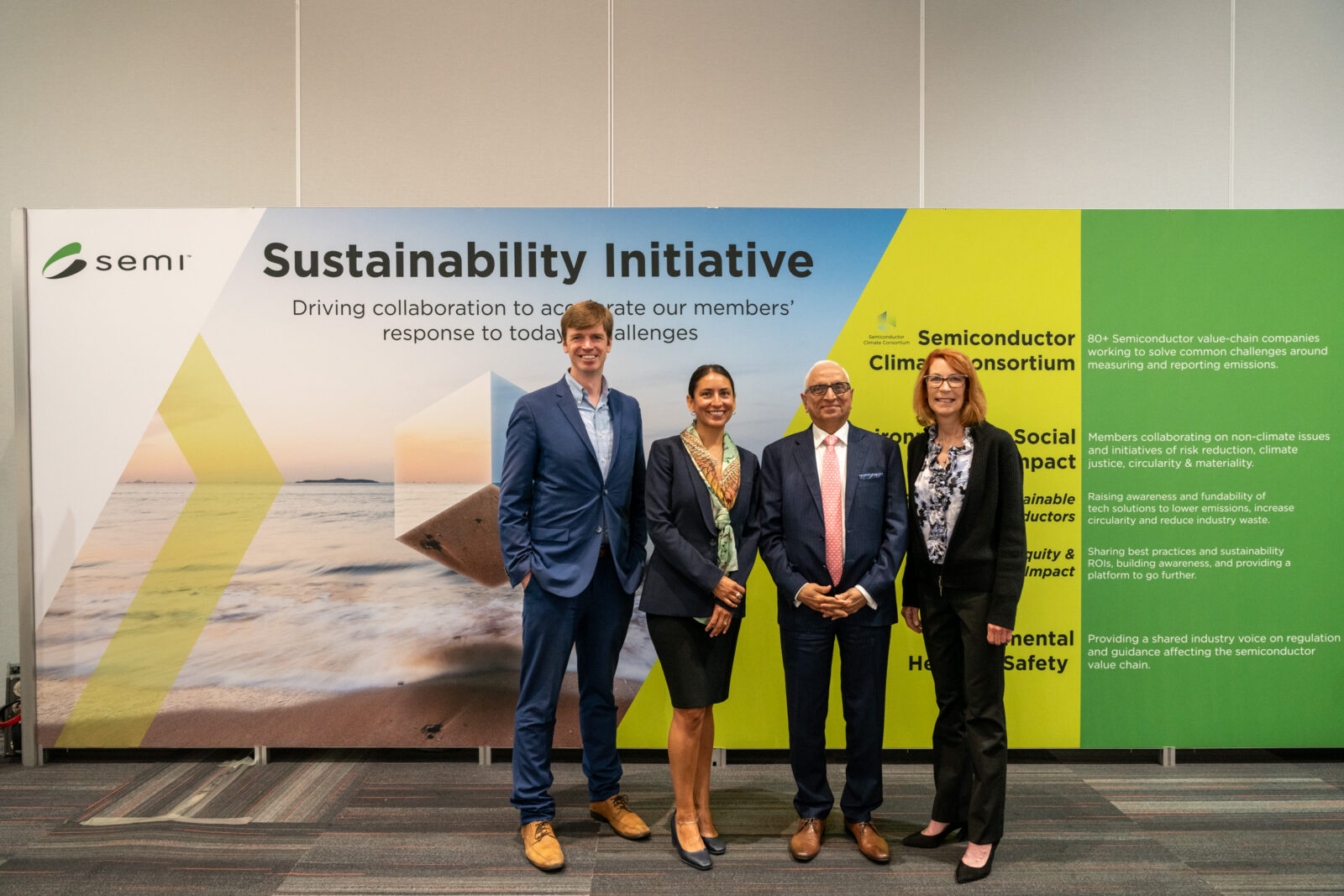
Last month, the Climate Equity Collaborative (CEC), co-founded by the National Wildlife Federation, organized a first-of-its-kind pavilion centered on climate equity and social impact at one of the semiconductor industry’s biggest annual events, SEMICON West in San Francisco, CA. SEMI represents the global semiconductor industry and organizes industry conventions such as this across the country and globe. At SEMICON West, professionals convene to address industry challenges, such as supply chain issues, workforce development, and climate change.
Exploring the Connections Between Industry and Climate Equity
On the convention’s first day, the Climate Equity Pavilion featured a packed schedule of keynotes, presentations, and panel sessions. These sessions explored the connections between climate change, equity, children’s health, technology, and the semiconductor industry’s role in each. Opening remarks from Collin O’Mara, Ajit Manocha (SEMI), Yana Garcia (California Environmental Protection Agency), and Mary Majors (EMD Electronics) kicked things off by underscoring the urgency and opportunity in coalescing the industry around climate and social impact.
Throughout the day, panel presentations focused on topics including circular economy, air quality, just transition, children’s health, public-private partnerships, and organizing employee impact groups around these topics. Speaking on the topic of just transitions, Frank Niepold, Senior Climate Education and Workforce Program Manager for the National Oceanic & Atmospheric Administration, explained, “To meet our equity challenges, our climate challenges, and our industrial policy challenges, those three things are going to be undermined if we don’t have a workforce strategy…and you can’t do workforce without education… Everyone should have a fair shot at these opportunities.”
Podcasts Highlight NWF’s Leadership
Later that day, Collin O’Mara and Dr. Mousumi Bhat, SEMI’s Vice President of Global Sustainability Programs, spoke with Francoise Von Trapp for the podcast 3D InCites Podcast. They discussed the role of the semiconductor industry in addressing the climate crisis in a way that advances equity rather than reinforce existing inequities.
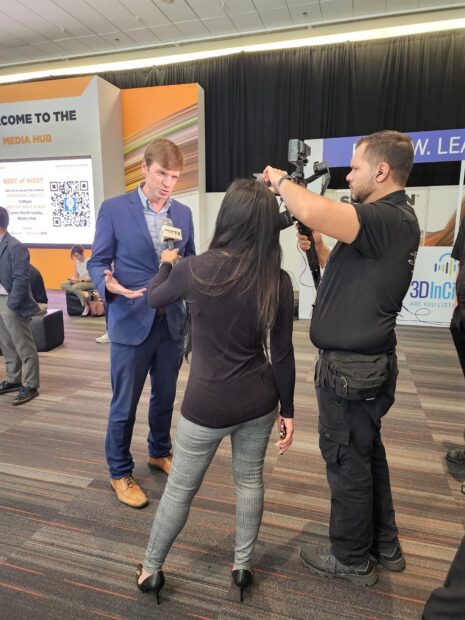
Collin talked about why NWF and the CEC were playing such a large role at an industry event. He indicated, “folks are realizing that semiconductors are at the heart of pretty much every climate solution… At the same time, there’s a fairly large environmental footprint from these activities, and there’s a huge economic opportunity to lift up communities that have been left behind, to help reduce pollution in communities that have been overburdened, to help young people have career opportunities. [We’re] trying to show the intersectionality of how these different opportunities present themselves – at a conference that is normally very technology-focused – showing that there is a people piece that has to be front and center if we’re going to achieve these multiple goals at the same time.”
Youth Perspectives and Opportunities
One of the core priorities of the CEC is to invite youth voices into climate conversations across all sectors. The CEC invited high schooler and Keep the Bay Beautiful co-founder, Anandika Carthikeyan, to speak about her organization’s work. Keep the Bay Beautiful focuses on waste management, e-waste in particular, in the San Francisco Bay area.
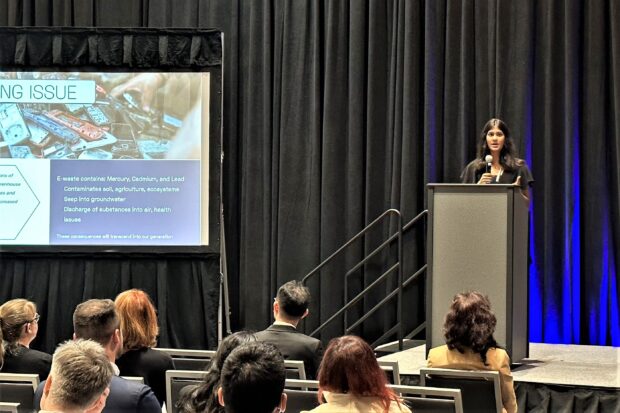
“Institutions and organizations all need to take active roles in promoting sustainable practices, through things like sustainability events and engaging with communities. And education needs to talk more widely about e-waste in general. Although the consequences of e-waste are absolutely adverse, I wholeheartedly believe that we can fight to reduce its impacts and reduce its levels.
I know many of you are probably very concerned about this issue, but I can assure you as someone from this younger generation, that the world is in good hands – at a young age we’re already being exposed to cutting edge innovations and we’ll be able to push the boundaries of scientific discovery as we grow older and pursue our careers. Together we will lift the burden of this conflict and will take a grand step toward a greener way of living.”
Anandika Carthikeyan, Co-Founder, Keep the Bay Beautiful
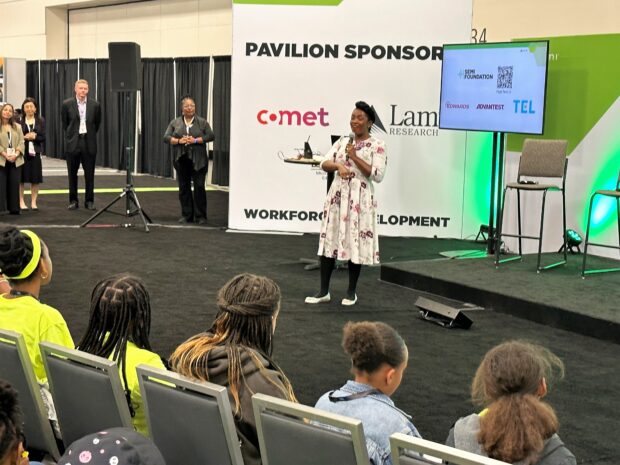
On the last day of the convention, a group of students from Self-eSTEM visited the convention. Self-eSTEM encourages and supports BIPOC girls to study and work in STEM careers. The students learned about semiconductors, academic and career pathways in technology, and air quality monitoring. Kylie Patterson, CHIPS for America’s Senior Advisor for Opportunity and Inclusion, delivered the opening address. Additionally, CEC invited Sonoma Technology scientists, Dr. Olivia Ryder and Alan Chan, to demonstrate air quality monitoring technology. The scientists provided the group with kits to take home and test the air quality in their own communities.
About the Climate Equity Collaborative:
The Climate Equity Collaborative™ (CEC) is a public-private-partnership that engages nontraditional partners in climate innovation and climate action. We aim to engage at the system-level by centering initiatives on climate education, children’s environmental health, and environmental justice. Additionally, we seek to construct more on-ramps to the global climate conversation through meaningful partnerships.
The impacts of climate change are complex, intersectional, and constantly evolving. Extreme weather, wildfires, and flash floods feel more frequent. These instances put a strain on infrastructure and health systems, and amplify existing systemic inequities. We assist corporate partners with programs addressing net-zero commitments, workforce needs, ESG, and equity in our changing global climate. Additionally, we create and catalyze opportunities for youth from underserved groups to participate in the climate conversation, public health decision-making, STEM learning, and climate careers.

